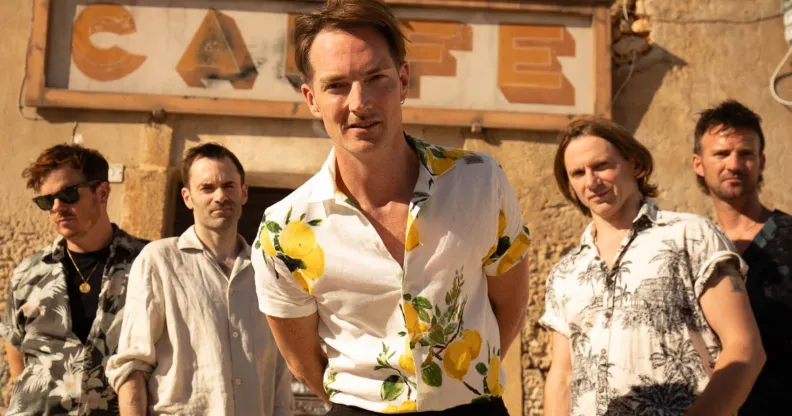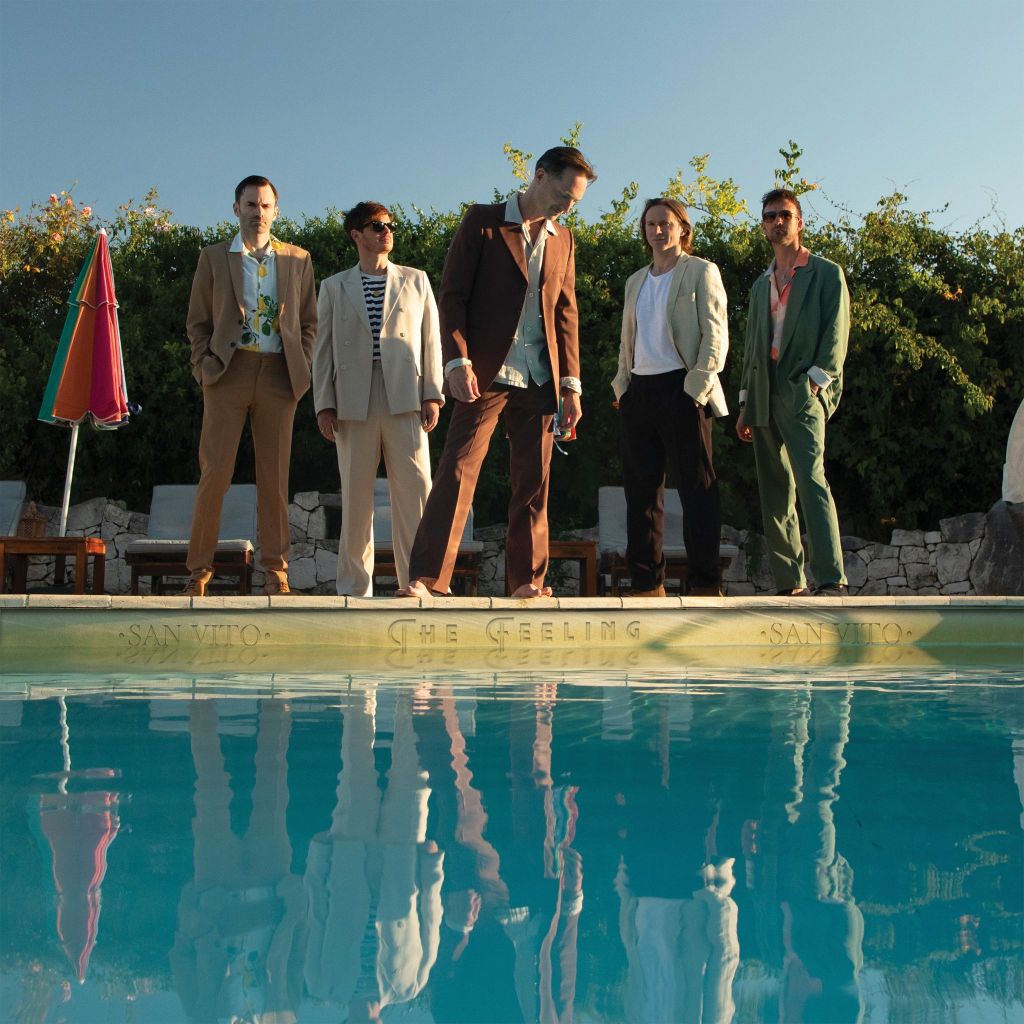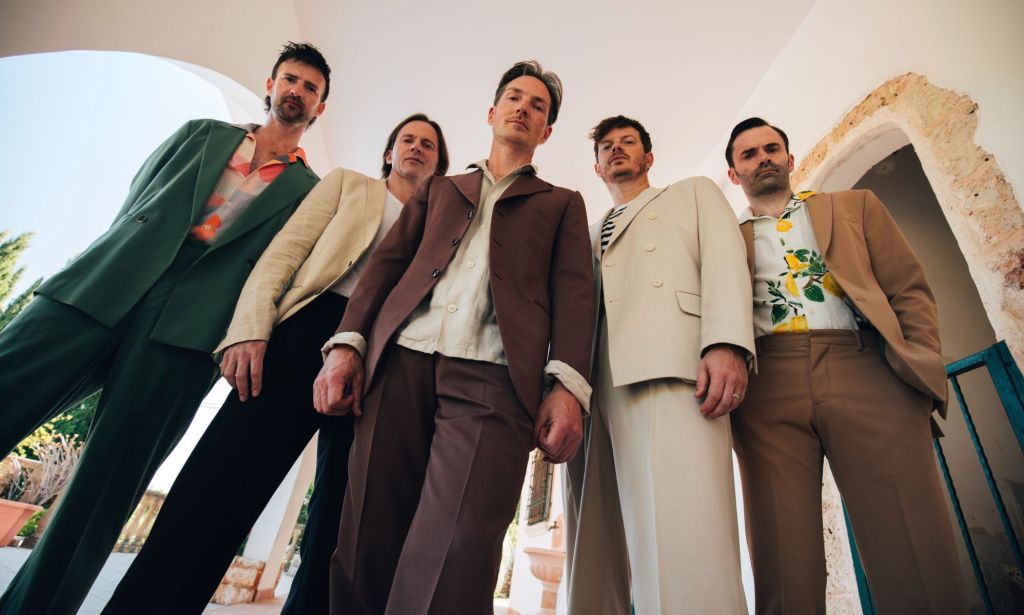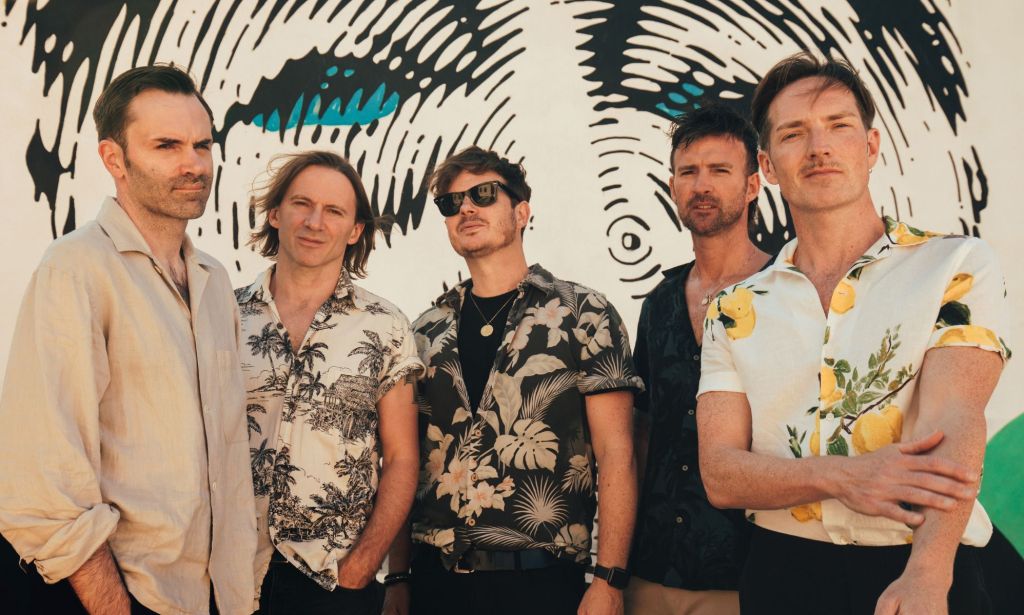The Feeling’s Dan Gillespie Sells: ‘We didn’t want to be a super-cool indie band’

Dan Gillespie Sells of The Feeling talks new album San Vito, coming up in a masc music industry, and the quest for cool. (Supplied)
The Feeling frontman Dan Gillespie Sells is reflecting on something many young queer people go through: leaving small-minded home towns in search of brighter lights in bigger cities.
“It’s pretty universal, that one,” the 45-year-old musician says, although his experience might have been a bit different given that, while he is gay, he was raised by lesbians and attended LGBTQ+ rights marches as a child.
Regardless, he’s written about that coming-of-age experience on shimmering new song “Call It Home”, taken from The Feeling’s upcoming latest studio album, San Vito (the record is named after the Italian town where it was the recorded in the summer, in a studio down the road from a house owned by band member Richard Jones and his wife, Sophie Ellis-Bextor).
In fact, San Vito is pretty queer all round: lead single “The Right Wrong” is about loving and living without boundaries, while opening track “War’s Not Won” is a battle cry for equality in an increasingly hostile world.

Indeed, while The Feeling are known for their mid-noughties pop rock hits, including “Fill My Little World” and “Sewn”, much of their discography is inexplicably wrapped in queerness, according to Sells.
“If people really want to, they could probably go back to our entire discography and hear that kind of queer angle that I have with everything I did,” he says. “It’s not something which I can separate myself from.”
Considering the band was formed at time when queer celebrities were still targets for tabloid vitriol, Gillespie Sells feels he escaped relatively unscathed – at least in terms of discussions about his sexuality. That could be because he was the only queer member in a five-man group, or because his lyrics were subtle. But it’s also because critics were focused on other things; namely, tearing the band’s music to shreds.
“It’s nothing to do with me being queer, I don’t think,” he says of the negative press they received following the release of their debut album, Twelve Stops And Home. “It was because we didn’t want to be your kind of super-cool indie band, who stare at the floor and wear the right jeans and trash hotel rooms.
“I thought it was clichéd and wasn’t very fabulous. I wanted to do something more interesting, colourful and melodic.”

While The Feeling’s distinct brand of vibrant pop earned them an Ivor Novello award, for songwriters of the year in 2007, and a Brit nomination, it also earned them a fair share of haters. Their debut was released in 2006 amid a slew of skinny-jean-clad indie rock music, and it’s fair to say that their sound went against the grain.
In one particularly scathing review, a critic promised that should they have to listen to the band again, they would “go one better than Vincent van Gogh and slice both ears off with a rusty hacksaw blade before dipping what is left of [their] head in a bowl of lukewarm, salty water”.
In general, the British music industry of the noughties was overwhelmingly male dominated, or, more specifically, full of “macho rock and roll, Cool Britannia-type nonsense,” as Sells puts it. Stepping from his family life, which brimmed with queerness, into a world that on the surface seemed aggressively heterosexual, was a challenge.
“At first, I hated it. I hated playing the indie clubs because we had to pay our dues, like all the bands did back in the day,” he says. Playing with the “tattooed, tequila-swilling” heavy rock groups didn’t match The Feeling’s energy. “We’re all misfits, really. I particularly found it a little threatening and a little unpleasant.”
But, as the band found success, bagged a number one album (2008’s Join with Us) and began to grow in the industry, things changed. They found that the “frustrated blokes swinging their dicks around” they initially encountered didn’t make up the entire industry. “As soon as you push past that, you realise there’s tons of amazing queer people working in that world,” Sells says.
Then, they simply began to care less about what their peers or critics thought of them. “If I’m entering my mid-twenties, my late-twenties, then my thirties, and I still give a s**t about what’s cool, then shoot me,” he begs jovially. “The great thing about getting a bit older is you stop caring about that.”

Almost 20 years after Twelve Stops Then Home, and nearly three decades since The Feeling first started making music together, the industry is in an entirely different place – not just in terms of streaming or TikTok’s influence on hits, but LGBTQ+ artists are celebrated for being just that. Lil Nas X, Reneé Rapp, Kim Petras and Troye Sivan thrive, in part, because of their queerness, not in spite of it.
Considering his family background, Gillespie Sells assumed there would have been more interest from the queer press, and from the queer world, when the band came about. “It’s weird. I wanted to be written about as a queer artist, and it never really happened,” Sells remembers. “I think it’s because I didn’t do their version of what they thought ‘gay’ was supposed to look like.”
Being raised by lesbians, he says, influenced how he wore his queerness. “I always felt I was in drag as a lesbian. I always felt like I’m giving you a genderf**k – it’s just that I grew up with women who look like me.
“I was still doing that very queer thing of following the women in my life and being inspired by [them], but their version of glamour was this androgynous, butch thing. My version of genderf**k is just may be a bit more subtle because of that.”
The pendulum for queer artists has now swung the other way – perhaps too far. Often, queer artists are labelled as such so explicitly that it becomes their defining feature, whether they want it or not. “If I was a queer artist now, and that’s all they wrote about me, that would also drive me mad,” Sells admits.
It’s a notion he thinks applies to life in general. “Identity has become such a heavily weighted element of politics and society, I’m not sure that it always serves us.” He longs for the day when people, and artists, are seen as queer, but where sexuality is “not necessarily always at the top of the list, always the first adjective” used to describe them.
“If we do dig our heels into identity to a point where it’s everything about us, I’m not sure we’re able to liberate ourselves properly… somewhere over the rainbow, there is another goal which goes beyond identity,” he says. “That’s me being a Buddhist now, as opposed to just a singer.”
For band members who met one another at the age of 16, and having pushed out six previous albums, San Vito sounds as if it was remarkably easy to make.
“One of the things that comes naturally to us as a band is joy,” Sells says. “It’s something I think stopped us being very fashionable, but something I’m very proud of.
“We still bring an awful lot of joy to what we do. That’s the thing that’s kept us going.”
San Vito is due out on 12 April and The Feeling tour the UK in April and May.
How did this story make you feel?

